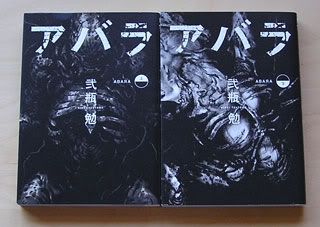
Chinatsu's Voice (千夏のうた)
by Sho Kitagawa (きたがわ翔)
published in Young Jump (Shueisha)
3 volumes (2004)
Amazon.jp
I often think of Sho Kitagawa in very similar terms to another artist named Mochiru Hoshisato. Both spent most of their careers wedded to one publisher, Kitagawa to Shueisha's Young Jump and Hoshisato to Shogakukan's Big Comic and Big Comic Spirits. Both are responsible for one relatively well-known classic (Kitagawa's Hotman, Hoshisato's Living Game) in specific genres (family soap opera and romantic comedy, respectively). And the rest of their outputs are uniformly derivative and mediocre. It's as if each were playing a game of roulette, circulating through similar ideas until one stuck and achieved popularity. Once they had gotten the big hit, they never again hit upon that winning formula.
Lowered expectations might help with finding a worthy champion amid so much banality. Sho Kitagawa seems to specialize in painfully sappy family-based dramatic stories that are tailor-made to be adapted into TV drama format, so much so that it's almost astonishing that only Hotman has ever managed to win itself this treatment. Consider the concept: a young man acts as a surrogate father to his parentless younger siblings and takes care of his fragile little daughter at the same time. If that doesn't sound like an excuse to make housewives weep themselves silly on the couch, then I've missed the entire point of Japanese TV dramas.
Flash forward several years to Chinatsu's Voice, Kitagawa's (as of yet) last serial work. Having remembered enjoying Hotman in a passing way, I pick up the three books hoping for some light entertainment. The first thing that jumped out at me was the drastic improvement in the backgrounds, much like the huge shift between Slam Dunk and Vagabond for Takehiko Inoue. However, unlike Inoue, Kitagawa is not a great character artist, merely a solid one. So all of these vibrant and hyper-detailed natural backgrounds in Chinatsu's Voice can be chalked up to hiring some very expensive or diligent assistants. Kitagawa is like Shin Takahashi (Saikano) in being a male artist utilizing the more abstract paneling and flowery tones of shojo manga. The end result, especially in this case, is a quick-paced and breezy read that is crammed full of beautiful detail. While there's nothing wrong with those two things, their combination often feels empty when so much work is put into so little story, and Chinatsu's Voice, in keeping with Kitagawa's TV drama style, is anything but subtle. The reading experience is almost wasteful.
The titular Chinatsu is a 10-year-old girl who has moved to a rural beach town to live with her grandparents. Her magical singing voice can cause butterflies to dance around her, heal dying puppies, and mend the wounds in people's hearts. If just that description sounds sappy or trite, you can imagine the effect stretched over several books. She uses her songs to heal various problems and coat over various domestic situations in her own family and others. There's really not much to elaborate upon because that just about covers it.
If it seems like this review has been riddled with comparisons to other artists, it's not entirely because I'm simply grasping for straws. It's because Kitagawa himself doesn't really have enough of a personality on his own to merit discussing on his own terms. At the end of the day, Chinatsu's Voice is nothing more than yet another beautifully-drawn yet completely boring read.
